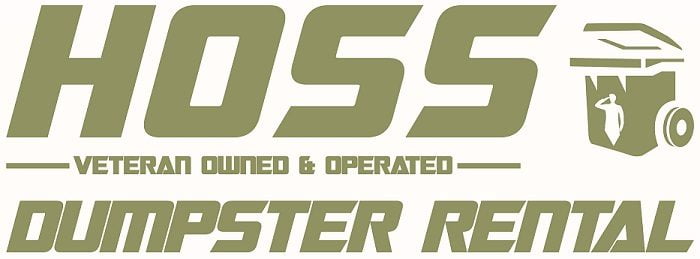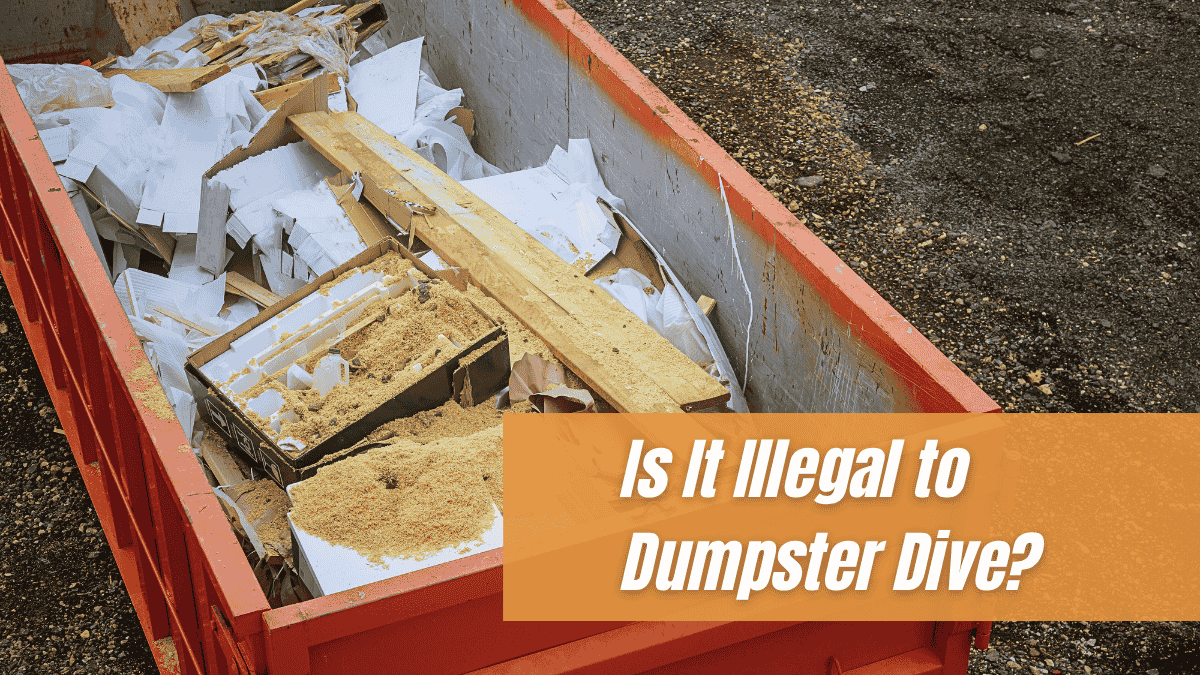Is It Illegal to Dumpster Dive?
Is It Illegal to Dumpster Dive? What You Need to Know in Washington
If you’ve ever wondered is it illegal to dumpster dive, the answer involves several layers of state laws and local regulations. Many people dive into dumpsters for reusable goods, recyclables, or discarded food, but the diving legality often depends on where, when, and how it’s done. Law enforcement agencies in Washington view these acts differently depending on private property restrictions and diving laws. In this guide, Hoss Junk Removal explains the legal issue, court rulings, and practical safety around dumpster diving in Pierce County, including Fife, Lakewood, Spanaway, South Hill, and Bonney Lake.
What Does “Dumpster Diving” Mean?
Dumpster diving refers to retrieving discarded items from trash or recycling containers. People engage in this practice for various reasons, from reusing materials and sustainability to financial necessity.
Common examples include:
-
Searching residential or curbside trash for reusable items.
-
Looking through commercial dumpsters behind stores.
-
Collecting recyclables or scrap for resale.
However, both law enforcement and local officials emphasize that even public dumpsters may have restrictions. Diving on private property without permission could quickly turn into a legal issue. So, before you act, it’s worth asking yourself — is it illegal to dumpster dive in your specific area?
The Legal Foundation: Federal, State & Local Laws
Federal Precedent: California v. Greenwood (1988)
A significant court ruling in 1988, California v. Greenwood, determined that trash left for collection no longer carries a reasonable expectation of privacy. Under this case law, items placed outside for disposal are considered abandoned.
However, the courts’ view did not grant free access to dumpsters on private or business property. Entering fenced areas or locked zones still violates diving laws and trespass regulations. Even if a dumpster appears public, a lawyer would confirm that its placement on private grounds could still make diving illegal.
How Washington State Treats Dumpster Diving
Washington State’s approach is more complex. The state constitution offers stronger privacy protections than federal law. While there’s no direct statute addressing dumpster diving, attorneys often point out potential violations through trespass or theft under property law.
The courts’ view in Washington generally protects individuals’ rights to their property until garbage collection occurs. This means store managers and business owners have the right to restrict access to dumpsters located on their property. The diving legality depends largely on location, signage, and public accessibility. For residents wondering is it illegal to dumpster dive near businesses or apartment complexes, the safest choice is to always ask for permission first.
Local Ordinances & City Codes (Pierce County / Cities)
Cities across Pierce County may have their own diving laws. For example:
-
Some cities allow access to trash bins placed curbside for public pickup.
-
Others consider dumpster diving a form of trespassing or littering.
-
City code enforcement often focuses on preventing property damage and health hazards.
Before attempting to dive, always verify local laws or contact an attorney familiar with your municipality’s regulations. Law enforcement in Pierce County frequently advises residents to avoid enclosed dumpsters or restricted areas. Understanding local codes helps you avoid asking later, is it illegal to dumpster dive here?
Where It Becomes Illegal: Key Risk Zones & Scenarios
Trespassing on Private Property
Entering private property without consent is the most common reason divers face law enforcement action. Businesses often post signs warning against trespass near dumpsters, and store managers can request police involvement. Once a warning is issued, returning can lead to a citation or misdemeanor charge under state laws.
Theft, Reclaiming, or Misuse
If a dumpster’s contents are not truly abandoned, taking them could violate property and diving laws. For example:
-
Removing items intended for recycling collection.
-
Taking personal data, leading to identity theft.
-
Reselling items without permission.
In such cases, consulting a lawyer is recommended to understand potential legal issues before engaging in this activity. It’s one of the simplest ways to avoid future confusion about whether is it illegal to dumpster dive under current state or city regulations.
Littering, Disorderly Conduct & Public Nuisance
Leaving a mess around a dumpster can draw attention from law enforcement and code enforcement officers. Many store managers file complaints if divers scatter trash, which can result in municipal fines. This is often treated as a nuisance or minor criminal offense under state law.
Health & Food Safety Restrictions
Public health codes in Washington prevent unsafe handling of discarded food. Diving through food waste can lead to contamination or injury, exposing divers and property owners to liability. Most courts view such acts as violations of state and municipal health regulations.
Is Dumpster Diving Legal in Washington (Pierce County & Cities)?
The short answer: dumpster diving isn’t entirely illegal, but it comes with risks. Public trash on accessible land is generally allowed, but fenced or restricted areas are off-limits. Law enforcement treats violations differently based on intent and location.
In Pierce County, private property protections are strong, and local ordinances give store managers authority to restrict access. Before attempting to dive, always review state laws or ask an attorney for clarity. When in doubt, it’s safer to consult than to guess is it illegal to dumpster dive in a specific neighborhood.
How to Dumpster Dive Responsibly & Legally in Pierce County
Steps to Stay on the Right Side of the Law
-
Stay off private property unless you have permission.
-
Look for signage—if it says “No Trespassing,” walk away.
-
Avoid enclosed or gated dumpsters.
-
Be polite if approached by law enforcement or store managers.
-
Keep the area clean to avoid fines under local code.
Safety Precautions & Best Practices
-
Wear gloves, boots, and long sleeves to prevent injury.
-
Avoid dumpsters containing sharp objects or chemical residue.
-
Never dive alone at night.
-
Keep interactions respectful and brief to avoid escalating any legal issue.
What Are the Penalties of Illegal Dumpster Diving?
Breaking diving laws in Washington can lead to:
-
Trespassing fines or citations under state statutes.
-
Civil penalties if you damage property.
-
Arrests for theft or identity-related crimes.
-
Court rulings that can include community service or probation.
Contacting an experienced lawyer can help if you face charges related to diving legality or property disputes.
Why Hire Professional Junk Removal Instead?
Professional junk removal services eliminate all the risks tied to diving laws and legal issues. Hoss Junk Removal offers:
-
Licensed, insured hauling compliant with state and local laws.
-
Safe waste disposal handled by trained professionals.
-
Protection from injury and liability.
Our team ensures legal compliance, protecting both you and your property from violations that could draw law enforcement attention.
How Much Does Professional Junk Removal Cost in Washington?
In Pierce County, junk removal pricing typically ranges from $150–$600, depending on property type and junk volume. Factors include:
-
Load size and weight.
-
Material type (furniture, debris, appliances).
-
Access difficulty and disposal site distance.
You’ll receive transparent quotes that comply with all state disposal codes.
Serving Pierce County & Nearby Cities
Hoss Junk Removal proudly serves all of Pierce County, including Fife, Lakewood, Spanaway, South Hill, and Bonney Lake. Our local team understands regional diving laws, safety regulations, and waste disposal codes, providing peace of mind and convenience for every customer.
FAQ — Dumpster Diving Laws & Safety in Washington
What are the signs of illegal dumpster diving:
-
“No Trespassing” or “Private Property” signage.
-
Locked dumpsters or fenced enclosures.
-
Law enforcement presence or warnings from store managers.
In what situations is dumpster diving illegal in Washington:
-
Trespassing on private property.
-
Diving after dark in secured commercial zones.
-
Violating state laws related to theft or property misuse.
How much can you get fined for illegal dumpster diving in Washington:
-
Court rulings may result in fines between $100–$500.
-
Repeat offenses can lead to misdemeanors or attorney involvement.
Why choose professional junk removal over dumpster diving:
-
Stay within diving laws and avoid law enforcement trouble.
-
Protect yourself from injury and fines.
-
Ensure clean, lawful disposal of waste from your property.
Conclusion & Call to Action
While is it illegal to dumpster dive remains a common question, the answer depends heavily on location and diving laws. What might be allowed in public could still violate private property or state law.
Avoid uncertainty by hiring Hoss Junk Removal—a fully licensed team familiar with Washington’s waste regulations. We handle all disposal safely and legally, so you never have to worry about law enforcement, court rulings, or injury.
- Phone: (253) 553-2978
- Serving: Pierce County (Fife, Lakewood, Spanaway, South Hill, Bonney Lake)

